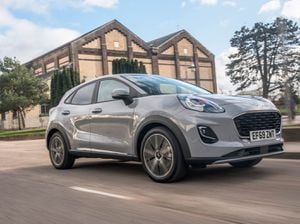Strongest February in 20 year for new car sales
The new car market recorded its strongest February in 20 years, figures show.

Nearly 85,000 new cars were registered last month, an increase of 14 per cent compared with February 2023, the Society of Motor Manufacturers and Traders said.
That is the highest February total since 2004 when more than 91,000 new cars were registered.
February is a low-volume month for sales ahead of the introduction of new number plates on March 1, which sparks a surge in purchases.
Luxury car manufacturer JLR, which makes its engines at the i54 at Wolverhampton, enjoyed growth in sales for both Jaguar and Land Rover.
Jaguar was up 136.5 per cent to 738 and Land Rover by 11.7 per cent to 1,517.
MG, which is based at Longbridge but has its cars made abroad, saw a 244.4 per cent rise to 3,493.
Volkswagen was the UK's top brand in February with 7,724 sales - up 13.3 per cent and the Ford Puma was the top-selling model at 2,535 – 6,736 for the year so far.
The SMMT reiterated its plea for "fairer" taxation of electric vehicles ahead of tomorrow's Budget as private uptake continues to struggle.
Private buyers accounted for just 18.2 per cent of new battery electric vehicles registered in the first two months of this year, with the overall 21.3 per cent increase in demand entirely sustained by fleets due to tax incentives.
The SMMT is urging Chancellor Jeremy Hunt to halve VAT on the purchase of new EVs, amend plans to introduce vehicle excise duty for EVs, and reduce VAT on public charging to bring it into line with home charging.
Chief executive Mike Hawes said: "The new car market's ability to deliver growth continues with its best February for 20 years.
"This week's Budget is an opportunity to ensure that growth is greener.
"Tackling the triple tax barrier as the market embarks on its busiest month of the year would boost EV demand, cutting carbon emissions and energising the economy.
"It will deliver a faster and fairer zero emission transition, putting Britain's EV ambition back in the fast lane."
Ian Plummer, commercial director at online vehicle marketplace Auto Trader, said: "Year-on-year growth in EV sales is encouraging but this is thanks to buoyant fleet sales, as growing numbers of drivers take advantage of benefit in kind and salary sacrifice schemes to overcome the electric upfront price barrier.
"With the 22 per cent Zero Emission Vehicle mandate target of all new car sales to be electric now in effect, some manufacturers are turning to substantial offers to stimulate flat retail demand and entice potential car buyers, and our data shows it's working.
"At the end of February, one in five new car inquiries sent via Auto Trader were for EVs thanks to a few heavily discounted models."
Under the ZEV mandate, at least 22 per cent of new cars sold by each manufacturer in the UK this year must be zero-emission, which generally means battery EVs.
The threshold will rise annually until it reaches 100 per cent by 2035.
Manufacturers that fail to abide by the rule or make use of flexibilities - such as trading allowances or carrying them over from previous years – will be required to pay the Government £15,000 per polluting vehicle sold above the limits.
In September last year, Prime Minister Rishi Sunak delayed the ban on the sale of new petrol and diesel cars and vans in the UK from 2030 to 2035.
Alex Buttle, co-founder of used car selling comparison website Motorway.co.uk, said: "Private car buyers urgently need more support to switch to electric.
"If the Government announces incentives for prospective EV drivers as well as plans to improve the charging infrastructure in the Budget tomorrow, sales could really start to power up."
James Hosking, managing director of AA Cars commented: “The momentum gained in the new car market last year has rolled into the first part of 2024, and dealers have plenty of reasons to be optimistic after the best February for 20 years.
“The launch of the new number plates on March 1 should provide another boost to demand and help end the first quarter of the year on a strong note.
“Consumer confidence is generally improving, and further falls in inflation will help the industry move forward smoothly, particularly if this is soon accompanied by a drop in interest rates.
“EV sales continue to increase to the detriment of diesel vehicles, and the expected launch of more affordable models this spring will provide even greater choice to drivers."”
Richard Peberdy, UK head of automotive for KPMG, said: “Ongoing pressure on household budgets and a higher cost of car finance mean that it’s still a difficult economic period for many people wanting to buy a new car, and a challenge for those trying to sell them. Overall, the UK market continues to hold up relatively well to this challenge, boosted by flowing supply of new vehicles, discounting on many forecourts, and export demand.
“While the used EV market is growing, sales growth of new EVs to consumers has plateaued. Many in the car industry are looking to this week’s Budget and hoping that demand can be stimulated by the likes of cutting VAT on EV purchasing and at public charge points. Increasing EV sales is now all the more important after the Zero Emission Vehicle Mandate began this year.”
John Wilmot, chief executive of car leasing comparison site LeaseLoco, said: "The positive momentum witnessed in the new car market last year has seamlessly transitioned into the first part of 2024, with the strongest February in two decades setting an optimistic tone for the rest of the year.
"Consumer confidence is steadily rising, buoyed by anticipated declines in inflation. If coupled with a reduction in interest rates, this trend promises continued growth and stability for the automotive industry.
"Electric vehicle sales remain on an upward trajectory, driven by fleet registrations. The imminent release of more budget-friendly EV models this spring will expand driver options and ensure momentum isn't lost.
"Governmental support is equally crucial, especially with growing evidence of private drivers hesitating towards the EV transition. Urgent action is imperative to address barriers such as high purchase costs and inadequate charging infrastructure. Decisive measures are essential to drive Britain's electric transition forward."





